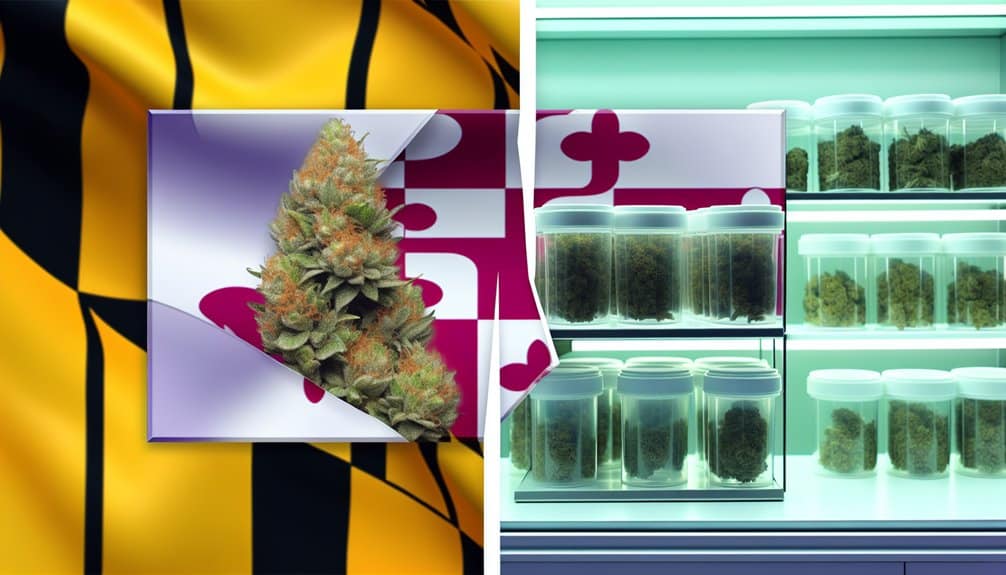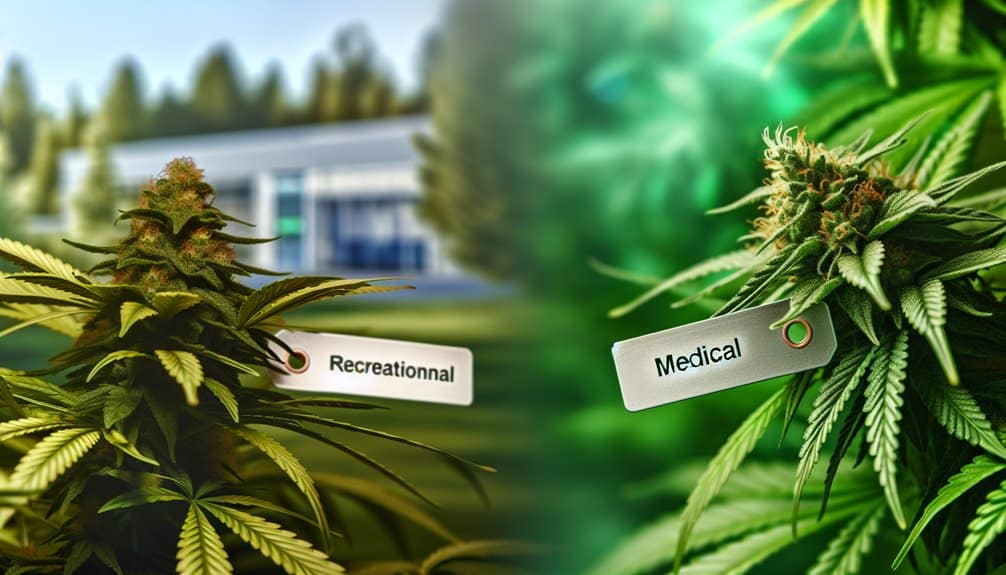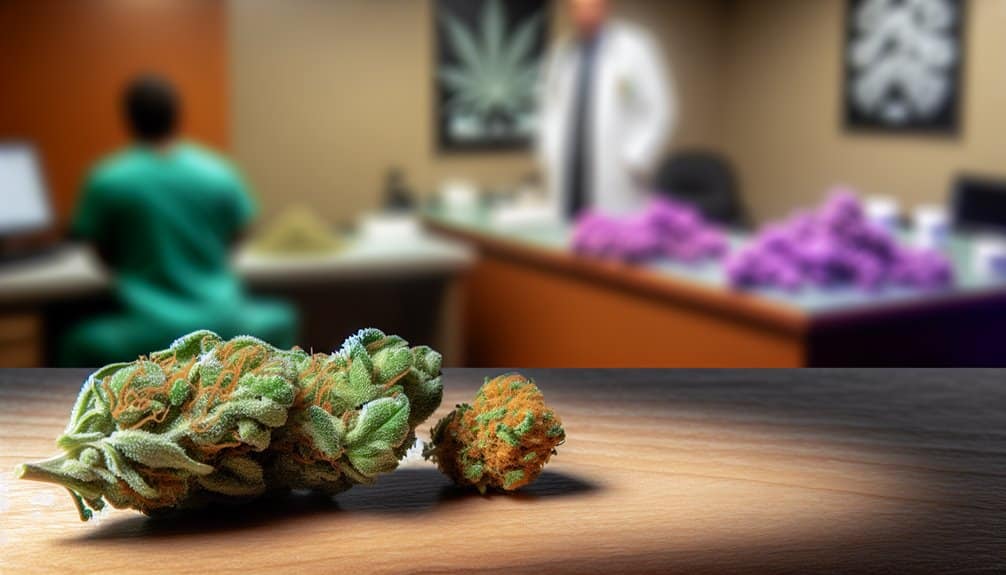Maneuvering the world of cannabis in Maryland can feel like trying to solve a complex puzzle. You might be wondering, what's the difference between recreational and medical cannabis? Well, it's not just about the quantity you can possess, it's also about the process of acquisition, the taxes involved, and the potential health benefits. If you're a recreational user, you're allowed up to 1.5 ounces of cannabis flower, provided you're over 21 and have a valid ID. However, if you're a medical cardholder, you can have up to 120 grams, depending on your qualifying condition. Intrigued? Stick around, we've only just scratched the surface.
The Legal Status of Cannabis in Maryland

While cannabis has had a tumultuous history in the U.S., Maryland took a decisive step in altering this narrative. The state's voters legalized marijuana in November 2022, and the Cannabis Reform Act was signed into law the following year. This move, overseen by the Maryland Cannabis Commission, positioned Maryland as the 20th state to embrace cannabis legality. You, as an adult, can now possess up to 1.5 ounces of cannabis flower or 12 grams of cannabis concentrates. Furthermore, you're allowed to grow two plants for personal use, but remember, they must be kept out of public view and secure. Understandably, possession regulations must be adhered to, as larger quantities can still incur penalties. The new legal status of cannabis in Maryland signals a significant paradigm shift. From July 1, 2023, the legal status of cannabis in Maryland has changed significantly, following the approval of Question 4 by voters.
Differences in Accessing Recreational and Medical Cannabis
Now that you're aware of the legal status of cannabis in Maryland, it's equally important to understand the differences between accessing recreational and medical cannabis.
- Possession Limits: Medical cardholders can possess up to 120 grams of cannabis, whereas recreational users are limited to 42.5 grams.
- Age Requirements: Medical cannabis is available to cardholders of any age with a qualifying condition, while recreational cannabis is strictly limited to those 21 and over.
- Registration: Medical cannabis requires a doctor's verification, registration with the MMCC, and often has a waiting period. Recreational users can purchase immediately with valid ID proving they're over 21.
- Cost: Medical marijuana cardholders often pay less due to tax exemptions, while recreational cannabis is subject to a 9% sales tax. Moreover, the Maryland Cannabis Administration (MCA) oversees the regulation and distribution of medical cannabis, ensuring safe and regulated products for medical patients (MCA's oversight).
Each route has its advantages, depending on your needs.
Health Benefits of Medical Cannabis

Although recreational usage may be more common, it's critical to understand the various health benefits of medical cannabis. It's been found to modestly reduce chronic pain in conditions like nerve damage and rheumatoid arthritis. Furthermore, it can decrease muscle spasms in people with multiple sclerosis. Medical cannabis has also shown promise for mental health, reducing anxiety in those with social anxiety disorder and improving symptoms of post-traumatic stress disorder. It's not just about physical relief; medical cannabis users report an approximately 8% better quality of life. They also use 14% fewer prescription medications, indicating its potential as an alternative treatment. So, while recreational use gets the limelight, don't overlook the health benefits of medical cannabis.
Potential Risks Associated With Recreational Cannabis
Just as medical cannabis has its benefits, recreational cannabis use comes with its own set of risks. The health risks associated with recreational use can be severe. In Maryland, cannabis-related emergency visits rose markedly after legalization. One severe condition, Cannabinoid Hyperemesis Syndrome (CHS), often leads to these emergency visits.
Here are four key risks to take into account:
- Increased Emergency Room Visits: High cannabinoid concentrations often result in stomach pains, migraines, nausea, and diarrhea leading to more ER visits.
- Cannabinoid Hyperemesis Syndrome (CHS): Long-term use can lead to this severe condition characterized by uncontrollable vomiting and weight loss.
- Legal and Regulatory Risks: Violation of public use restrictions can lead to fines and penalties.
- Financial Implications: The 9% sales tax on recreational cannabis can make it costly compared to tax-exempt medical cannabis.
Understanding these risks can help you make more informed decisions about cannabis use.
Qualifying Conditions for Medical Cannabis Use

In Maryland, qualifying for medical cannabis use involves meeting a set of specific conditions. These qualifying conditions range from anorexia and PTSD to severe or chronic pain. Other symptoms that could qualify include severe nausea, persistent muscle spasms, and conditions causing severe or persistent symptoms. More broadly, any severe chronic medical condition unresponsive to treatment may qualify if a physician determines that the symptoms can be relieved by medical cannabis. For minors, additional requirements apply. The minor must have a qualifying condition, and a caregiver must consent, register, and prove their relationship to the minor. The caregiver must also be at least 21 years old. Understanding these conditions can help you better serve those eligible for medical cannabis.
Understanding the Role of Cannabis Dispensaries in Maryland
Having a grasp of the conditions qualifying for medical cannabis use in Maryland, it's equally important to understand how cannabis dispensaries function within the state. Dispensary operations depend on strict licensing and regulation. They must present credible cannabis security plans and adhere to specific operating hours.
Dispensaries are key to ensuring safe, regulated access to cannabis, emphasizing:
- Compliance with Maryland's cannabis regulations
- Restricting access to patients, caregivers, and adults over 21
- Prohibiting sales through unlicensed parties
- Operating only during designated hours
The Impact of Recreational and Medical Cannabis on Public Health

While the legalization of recreational cannabis in Maryland on July 1, 2023, brought about a sense of freedom and choice for many, it's also worth noting the consequential impact on public health. The Maryland Department of Health has reported a significant increase in cannabis-related emergency department visits and calls to poison control centers, particularly among the younger population. This surge in cannabis usage has highlighted the need for effective education and prevention programs, as well as safe storage of cannabis products. The data collected is instrumental in shaping public health programs, ensuring that those affected by cannabis use receive the support they need. While cannabis legalization has its benefits, it's essential to continue monitoring its effects on public health.
Choosing Between Recreational and Medical Cannabis: A User's Perspective
As you navigate the world of legal cannabis in Maryland, you may find yourself at a crossroads, weighing the pros and cons of recreational versus medical cannabis. Personal testimonials and user experiences often highlight the following benefits of medical cannabis:
- Cost Savings: With tax exemptions and special discounts, you'll save more with a medical card.
- Higher Possession and Cultivation Limits: Medical users can possess and grow more, reducing frequent restocks or purchases.
- Access to More Potent and Specialized Products: Medical dispensaries offer tailored, potent strains with higher CBD content.
- Regulatory and Age-Related Benefits: Medical users, regardless of age, receive priority service and guidance from licensed cannabis doctors.
Consider these factors when choosing your path in Maryland's cannabis landscape.
Future Trends in Maryland's Cannabis Legislation

Looking ahead, you'll see that the future of Maryland's cannabis legislation is marked by a slew of regulatory, financial, and policy changes. Social equity initiatives, like the $5 million grant program, will open new doors for minority-owned businesses. Regulatory changes are ongoing, with the Maryland Cannabis Administration refining the industry's framework. Meanwhile, the tax revenue implications are significant. Adult-use cannabis sales are projected to generate over $100 million in 2025, funding various state programs. These funds will support small businesses and public health initiatives. You'll notice that employment protections, odor-based searches, and public use penalties are all areas of legislative focus. So, stay informed, as these changes will shape the future of Maryland's cannabis industry.
Conclusion
So, whether you're a casual user or seeking relief from a chronic illness, understanding Maryland's cannabis laws is essential. For example, consider John, a medical cardholder. He enjoys tax exemptions and increased possession limits, making his treatment more affordable and accessible. However, he had to go through a doctor's verification and register with the Maryland Medical Cannabis Commission. Always make sure you're informed about the laws and benefits that apply to your situation.
If you have questions or want to learn more about how medical cannabis can benefit you, I invite you to visit Fells Point Cannabis Docs of Maryland or give them a call at (410) 401-4200. They're friendly and knowledgeable, ready to help you navigate the process. Don't hesitate to reach out; your journey to relief could be just a call away!

